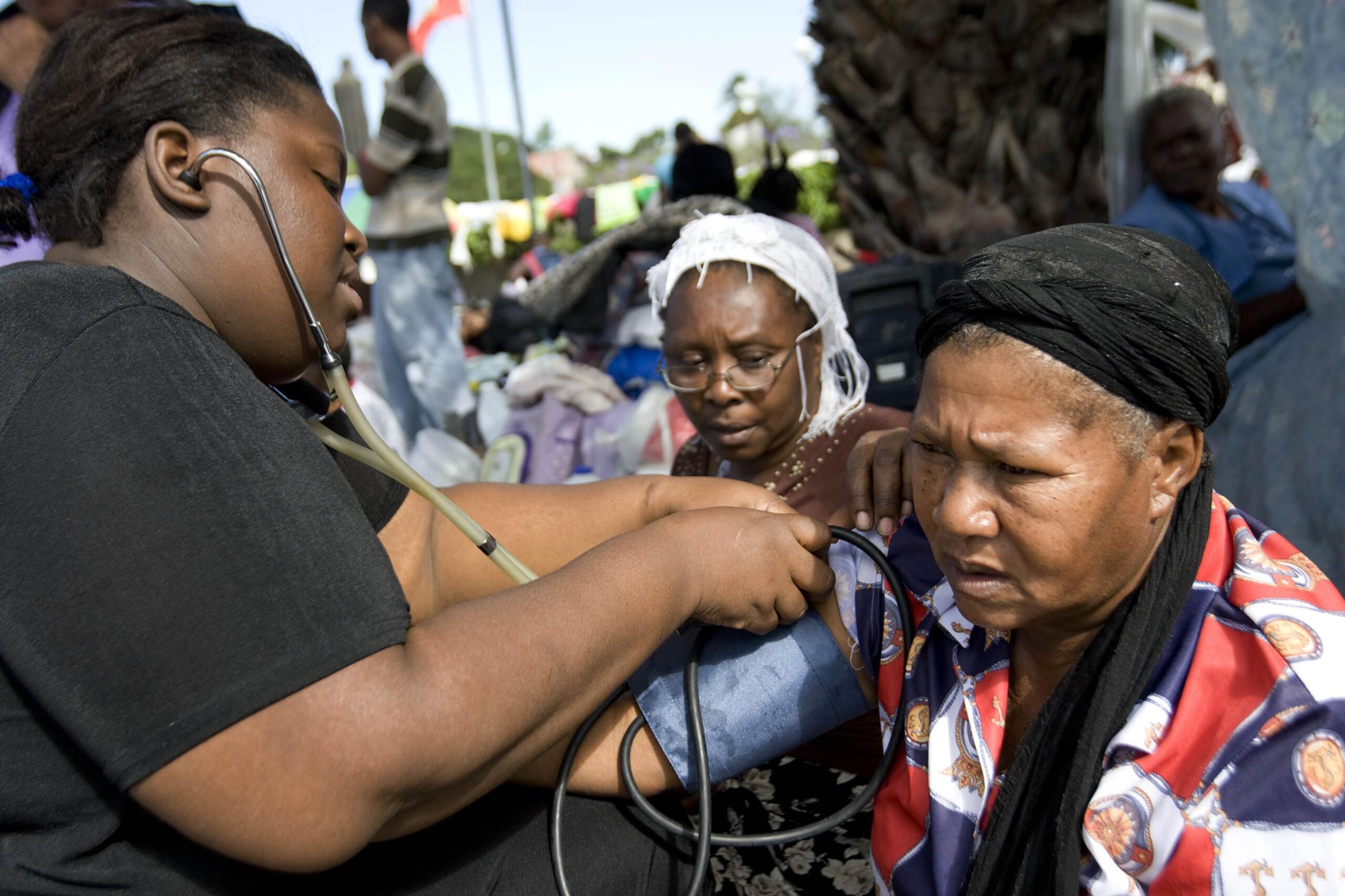A new study finds cardiovascular disease rates in Haiti are at least three times greater than among Black Americans
In the first population-based study to estimate the number of people living with cardiovascular disease in Haiti, researchers from the local health-care organization GHESKIO and Weill Cornell Medicine in New York City found that12% of participants from the nation’s capital—Port-au-Prince—have early-onset heart failure. That rate is more than 15 times higher than previous estimates and at least three times greater than among Black Americans.
The research emerging from the study, published in The Lancet Regional Health Americas, “is directly tied to improving health outcomes in Haiti as a model for similar low-income settings,” says Margaret McNairy, the study’s principal researcher and a member of Weill Cornell Medicine’s Center for Global Health.
Although it’s projected that 80% of global cardiovascular diseases affect people in low- and middle-income countries, researchers note that before this study little direct data was available from those settings that quantifies how many individuals have these conditions, whether the statistics are changing, and what the consequences for these populations are.
The findings reveal that almost 15% of Haitian adults live with some combination of heart failure, stroke, heart attack, or chest pain, the majority of them suffering from stiffening of the heart muscle.
These figures suggest that cardiovascular diseases are a pervasive problem for Haitians, among whom the most common risk factor for heart failure is high blood pressure, known as hypertension. Despite the link between the two conditions, an earlier study demonstrates that only 13% of Haitian adults with hypertension are able to control their blood pressure.
Local data is essential in “designing pragmatic, tailored interventions for primary prevention and cardiovascular disease treatment,” says Lily Yan, the study’s corresponding author and an assistant professor of medicine at Weill Cornell. “If we can reduce blood pressure even a little on a population level, we can reduce cardiovascular disease mortality.”
Inside the Study
From 2019 to 2021, GHESKIO community outreach workers surveyed participants the Haiti Cardiovascular Disease Cohort, a population-based urban cohort of about 3,000 Port-au-Prince residents older than 18. Of those participants, 58.1% were female.
All responded to questions about their health and underwent a comprehensive physical exam, which included blood pressure readings and blood work, at the GHESKIO cardiovascular disease clinic. They also completed noninvasive tests, including electrocardiograms, which measure the heart’s electrical activity, and echocardiograms, ultrasound scans that shows how well the heart muscle and valves function.
Of the participants with heart failure, 68.5% were women, and the median age was 57—much younger than the 72-year median age recorded among similar U.S. residents. Investigators are examining the reason for the gender difference.
Heart failure falls under the umbrella of cardiovascular diseases. It’s a chronic condition that occurs when the heart muscle can’t pump enough blood to meet the body’s demands. As a result, blood often pools and causes fluid to accumulate in the lungs and legs, causing shortness of breath and swelling of the lower extremities.
Heart failure is also associated with extremely high one-year mortality, McNairy says. The most common subtype was heart failure with preserved ejection fraction, observed in 80.4% of participants. Although traditionally considered a disease of the elderly, this type of heart failure can also affect younger patients, reducing their quality of life.
Heart Disease Prevention
Focusing on prevention strategies, Weill Cornell and GHESKIO are partnering with the Haitian Ministry of Health and Haitian College of Cardiology to develop guidelines and train health-care workers on the proper way to measure blood pressure. They also are expanding knowledge and services for cardiovascular diseases, including community-based screening and treatment of risk factors such as high blood pressure.
“Prevention is the most important aspect of what we do,” says Rodney Sufra, lead physician at the GHESKIO cardiovascular disease clinic in Port-au-Prince. “We believe [that] preventing heart failure and cardiovascular death by controlling elevated blood pressure is the critical step.” The researchers also found that heart failure was associated with obesity, chronic kidney disease, depression, and stress.
Other initiatives are aimed at teaching slum communities about the role that excess salt plays in increasing blood pressure and about the importance of reducing consumption, McNairy says. Along with her collaborators, she also is exploring the effects of heavy metals and air pollution on high blood pressure and how to decrease those exposures.
“GHESKIO, with Weill Cornell Medicine’s support, has helped treat thousands of patients with heart failure across all their clinics,” says Vanessa Rouzier, an assistant professor of medicine at Weill Cornell and director of research at GHESKIO. The organization provides free outpatient care and medications and refers individuals to local hospitals as needed for inpatient care, Sufra adds.
Next Steps
For four decades, Weill Cornell has partnered with GHESKIO, to forge “an equitable global health partnership that is built on the pillars of clinical care to the most vulnerable, training, and capacity-building of Haitians,” says McNairy.
The joint endeavor to stymie cardiovascular diseases in Haiti evolved from prior initiatives to rein in HIV/AIDS and tuberculosis (TB). For more than three decades, HIV/AIDS was the leading cause of adult mortality in Haiti, says Jean Pape, executive director of GHESKIO and a professor of medicine at Weill Cornell. In 1982, GHESKIO was founded as the first institution in the developing world to champion the battle against HIV/AIDS.
“Our work as one of the first and one of the largest HIV and TB centers in the world has largely contributed to turn AIDS into the seventh cause of national mortality,” Pape says. “Cardiovascular diseases have become by far the number one cause of death. Our AIDS patients are more likely to die of cardiovascular diseases than HIV-associated infections.”
In Port-au-Prince, almost 1 in 3 adults, including many under age 30, has high blood pressure. The number of 18- to 30-year-olds with high blood pressure in Haiti is about two to four times greater than that of their young Black American counterparts.
Although 97% of adults in Haiti have undergone screening for high blood pressure, only 13% have it under control, says Mary Masterson, a program director at the U.S. National Heart, Lung, and Blood Institute, part of the National Institutes of Health in Bethesda, Maryland. The institute has been funding the cardiovascular disease study in Haiti.
Earlier research in Haiti revealed that women are six times more likely to be obese than men, but another study found that this didn’t influence the prevalence of heart failure between the two groups.
“This type of finding warrants exploration and emphasizes the potential impact this study and others will provide to the research community,” Masterson says. “There is a need to better understand the mechanisms and risk factors influencing the development and progression of heart disease.”
Susan Kreimer is a freelance medical writer in New York City.




